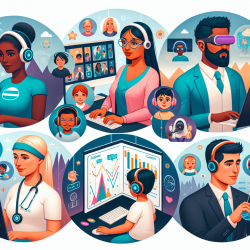The world of therapeutic devices is rapidly evolving, offering possibilities that extend beyond traditional species-typical abilities. The research article "Hearing Beyond the Normal Enabled by Therapeutic Devices: The Role of the Recipient and the Hearing Profession" dives into these advancements, particularly focusing on hearing enhancements. As audiologists and speech pathologists, understanding these developments is crucial for adapting to future challenges and opportunities.
The Changing Landscape of Hearing Devices
Traditionally, therapeutic devices like hearing aids and cochlear implants were designed to restore hearing to a species-typical level. However, recent advancements suggest that these devices might soon enable users to surpass normal human hearing capabilities. This shift presents a unique opportunity for professionals in the hearing field to rethink their roles and responsibilities.
Insights from the World Federation of the Deaf
The research conducted surveyed members of the World Federation of the Deaf, revealing a spectrum of opinions on beyond-normal hearing capabilities. A significant portion supports developing devices that enhance hearing beyond typical human abilities. This sentiment reflects a broader acceptance of enhancement technologies within the community.
Implications for Audiologists and Speech Pathologists
The potential for hearing devices to exceed normal capabilities raises ethical and practical considerations for professionals:
- Ethical Considerations: Codes of ethics across various professional organizations emphasize patient welfare and informed decision-making. Audiologists and speech pathologists must navigate these ethical landscapes as they consider recommending enhancements that go beyond traditional norms.
- Professional Development: Staying informed about technological advancements is crucial. Engaging in continuous education through conferences, webinars, and publications will help practitioners remain at the forefront of this evolving field.
- Patient-Centric Approach: Understanding patient desires and concerns is key. Professionals should facilitate discussions that consider both the potential benefits and risks associated with enhanced hearing capabilities.
Navigating the Future
The discourse around hearing enhancements is still developing. As professionals, it is vital to engage in this conversation actively. Encouraging further research and participating in interdisciplinary dialogues will ensure that ethical standards keep pace with technological advancements.
Encouraging Further Research
The preliminary data from the World Federation of the Deaf survey highlights areas for further exploration. Developing more accessible surveys and engaging diverse communities can provide richer insights into public sentiment and inform future practices.
Conclusion
The potential for therapeutic devices to enhance hearing beyond normal levels presents both challenges and opportunities for audiologists and speech pathologists. By embracing these changes with an open mind and a commitment to ethical practice, professionals can lead the way in integrating these advancements into everyday practice.
To read the original research paper, please follow this link: Hearing Beyond the Normal Enabled by Therapeutic Devices: The Role of the Recipient and the Hearing Profession










